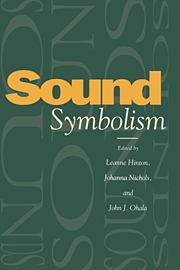Book contents
- Frontmatter
- Contents
- List of contributors
- 1 Introduction: Sound-symbolic processes
- PART I Native American languages north of Mexico
- PART II Native languages of Latin America
- PART III Asia
- PART IV Australia and Africa
- PART V Europe
- 14 Regular sound development, phonosymbolic orchestration, disambiguation of homonyms
- 15 Modern Greek ts: beyond sound symbolism
- 16 On levels of analysis of sound symbolism in poetry, with an application to Russian poetry
- 17 Finnish and Gilyak sound symbolism – the interplay between system and history
- PART VI English
- PART VII The biological bases of sound symbolism
- Index
14 - Regular sound development, phonosymbolic orchestration, disambiguation of homonyms
Published online by Cambridge University Press: 04 August 2010
- Frontmatter
- Contents
- List of contributors
- 1 Introduction: Sound-symbolic processes
- PART I Native American languages north of Mexico
- PART II Native languages of Latin America
- PART III Asia
- PART IV Australia and Africa
- PART V Europe
- 14 Regular sound development, phonosymbolic orchestration, disambiguation of homonyms
- 15 Modern Greek ts: beyond sound symbolism
- 16 On levels of analysis of sound symbolism in poetry, with an application to Russian poetry
- 17 Finnish and Gilyak sound symbolism – the interplay between system and history
- PART VI English
- PART VII The biological bases of sound symbolism
- Index
Summary
Introduction
By way of prelude let me clarify a few terminological preferences. For the purpose of this inquiry I shall assume that “phonosymbolism” and “sound symbolism” are two interchangeable labels for the same concept, as are indeed the correlated adjectives “phonosymbolic” and “sound-symbolic.” I further propose to take it for granted, on the basis of my readings, that “expressivity” (allegedly patterned on German Expressivität conveys virtually the same message as “phonosymbolism,” except that it tends to invite discussion in a psychological key rather than in purely linguistic terms. The clearest proof of their fundamental identity is the well-established fact that tone-setting scholars, chefs d’école, if addicted to the use of “expressivity,” have hesitated, not to say studiously avoided, having recourse to the rival term “sound symbolism.” On the other hand, German Affekt, z latinism meaning literally “emotional state of disturbance,” and its offshoots affektiv and, particularly, affektisch despite various significant overlaps with the realm of phonosymbolism here under scrutiny, pertain basically to the province of psychology rather than involving a straight approach to the study of language; the same holds for most uses of “emphatic.”
Finally, sporadic attempts have been made in the recent past to set aside the adjacent, but discrete, territory of “morphosymbolism.” If phonosymbolism, as is yet to be shown, has a semantic dimension, morphosymbolism, conversely, has a grammatical dimension. Thus, with a single exception (which happens to involve a word borrowed from a different, if genetically related, language), all qualifying adjectives in modern Spanish turn out to be incompatible with monosyllabicity, even though in the Middle Ages the situation was radically different.
- Type
- Chapter
- Information
- Sound Symbolism , pp. 207 - 221Publisher: Cambridge University PressPrint publication year: 1995
- 1
- Cited by



